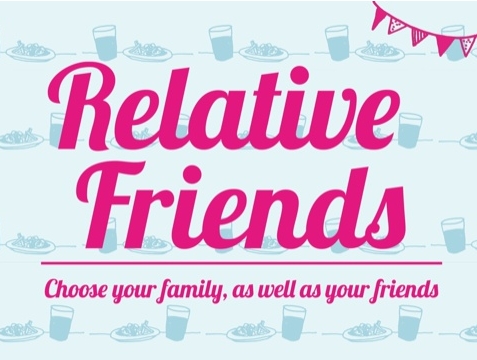
noun
- a person who is connected with another or others by blood or marriage.
- something having, or standing in, some relation or connection to something else.
- something dependent upon external conditions for its specific nature, size, etc. (opposed to absolute).
- Grammar. a relative pronoun, adjective, or adverb.
adjective
- considered in relation to something else; comparative: the relative merits of democracy and monarchy.
- existing or having its specific nature only by relation to something else; not absolute or independent: Happiness is relative.
- having relation or connection.
- having reference or regard; relevant; pertinent (usually followed by to): to determine the facts relative to an accident.
- correspondent; proportionate: Value is relative to demand.
- (of a term, name, etc.) depending for significance upon something else: “Better” is a relative term.
- Grammar.
- noting or pertaining to a word that introduces a subordinate clause of which it is, or is a part of, the subject or predicate and that refers to an expressed or implied element of the principal clause (the antecedent), as the relative pronoun who in He’s the man who saw you or the relative adverb where in This is the house where she was born.
- noting or pertaining to a relative clause.
adjective
- having meaning or significance only in relation to something else; not absolutea relative value
- (prenominal) (of a scientific quantity) being measured or stated relative to some other substance or measurementrelative humidity; relative density Compare absolute (def. 10)
- (prenominal) comparative or respectivethe relative qualities of speed and accuracy
- (postpositive foll by to) in proportion (to); corresponding (to)earnings relative to production
- having reference (to); pertinent (to)matters not relative to the topic under discussion
- grammar denoting or belonging to a class of words that function as subordinating conjunctions in introducing relative clauses. In English, relative pronouns and determiners include who, which, and thatCompare demonstrative (def. 5), interrogative (def. 3)
- grammar denoting or relating to a clause (relative clause) that modifies a noun or pronoun occurring earlier in the sentence
- (of a musical key or scale) having the same key signature as another key or scaleC major is the relative major of A minor
noun
- a person who is related by blood or marriage; relation
- a relative pronoun, clause, or grammatical construction
late 14c., “a relative pronoun,” from Old French relatif (13c.), from Late Latin relativus “having reference or relation,” from Latin relatus, past participle of referre “to refer” (see refer). Meaning “person in the same family” first recorded 1650s.
early 15c., “having reference,” from Middle French relatif and directly from Late Latin relativus (see relative (n.)). Meaning “compared to each other” is from 1590s; that of “depending on a relationship to something else” is from 1610s.
 Liberal Dictionary English Dictionary
Liberal Dictionary English Dictionary